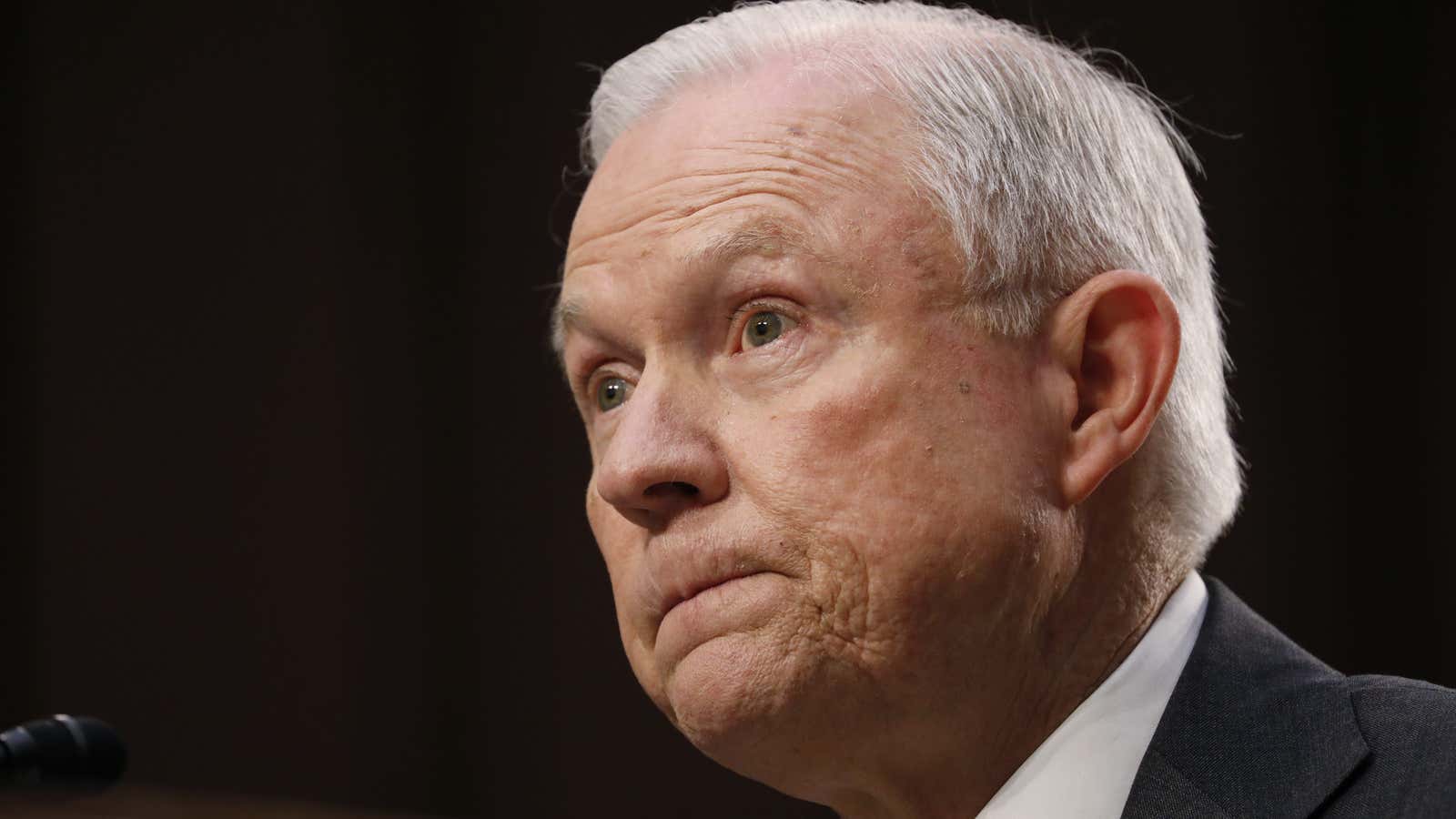US attorney general Jeff Sessions was grilled for about three hours in front of the US Senate Intelligence Committee on June 13, but the hearing did little to move forward the committee’s investigation into Russia’s meddling in the presidential election, or to better explain why FBI director James Comey was fired in May.
In part that’s because Sessions answered many of the questions he was asked with a variation of “I don’t recall” or “I don’t think so.” The evasiveness of the US federal government’s top law enforcement officer and legal advisor left some of the senators doing the grilling visibly frustrated. Sessions said any suggestion that he colluded with the Russians “to hurt this country,” and even those that implied that he was aware of any collusion, were “appalling and detestable lie[s].”
But Sessions’ testimony did little to clear up suspicion about potential collusion between US president Donald Trump’s campaign staff and Russian officials, because the attorney general often stopped short of saying definitively that something did or did not happen, and seemed imply he had a limited memory of events that occurred just a year ago.
Here’s a short list of some of the things that Sessions could not say for sure:
Whether Sergey Kislyak, the Russian ambassador to the US, was at a Trump speech that Sessions attended, or whether Sessions spoke to him.
Sessions and Kislyak both attended an April 2016 Trump at the Mayflower Hotel in Washington, DC.
But the attorney general told the senate he “did not remember that, but I understand that he was there.” In his opening testimony, Sessions said, “[I] did not have any private meetings, nor do I recall any conversations, with any Russian officials at the Mayflower Hotel.”
Whether Trump campaign officials spoke with Russian officials or businessmen during the campaign.
Sessions, then a senator from Alabama, was brought on to the Trump campaign as the chairman of its foreign policy team in 2016. From that point on, he traveled with the Trump team and made speeches praising Trump on the campaign trail. Asked by Joe Manchin, the Democratic senator from West Virginia, whether a list of Trump campaign advisors were in direct contact with Russian officials, Session said “I have no information” or “I don’t recall” to each name—except for Carter Page, a campaign advisor who in May of this year admitted to the Senate committee that he had meetings with a Russian “junior attaché that the US intelligence community believes to be a Kremlin spy. About Page, Sessions said “I don’t know.”
Whether he would have left the campaign if he witnessed Russian involvement.
Asked by senator James Risch, a Republican from Idaho, whether Sessions had heard “a whisper or suggestion or anyone making making reference within [the Trump] campaign that somehow the Russians were involved in that campaign,” the attorney general responded “I did not.” Risch followed up by asking if Sessions would have headed towards the exit if that was what he saw. “Maybe,” Sessions said.
Later, Sessions clarified he would have left if he saw anything improper.
What he and president Trump discussed concerning Comey’s firing and the Russian investigation.
Sessions’ strategy throughout the hearing appeared to be to not answer any questions related to his conversations with president Trump. It was perplexing to some senators on the committee, who grilled him about whether Trump was invoking executive privilege, which allows the president to ask his cabinet members not to divulge information. Trump was not, Sessions said.
But Sessions appeared to have been invoking executive privilege on behalf of the president. “It is premature for me to deny the president a full and intelligent choice about executive privilege,” Sessions said.
Whether he could provide more information behind closed doors.
Sessions was unclear as to whether he could answer more questions in a classified, private briefing, saying “I’m not sure that executive privilege is not waived by going into a closed session.”
